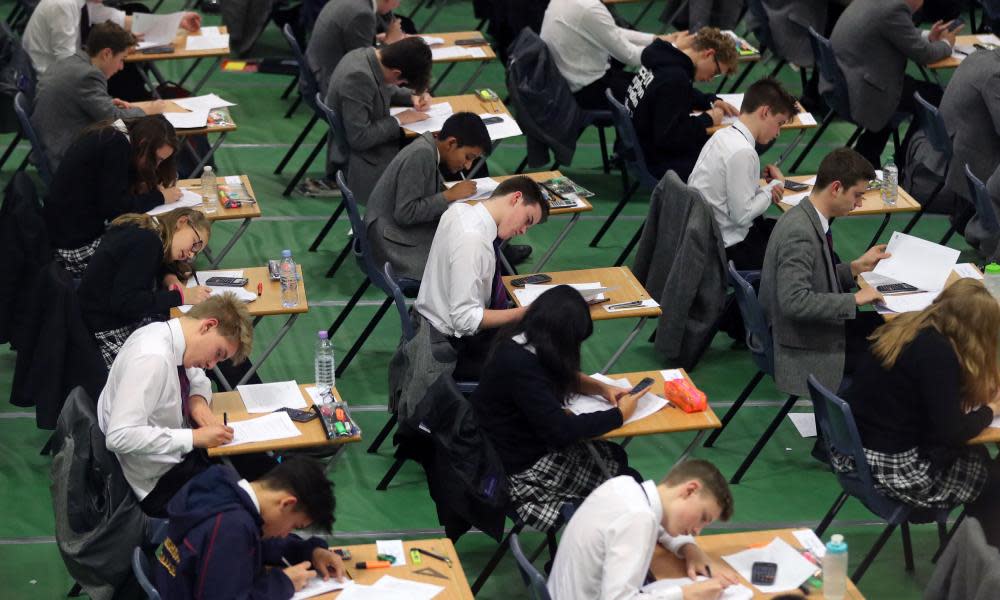Sprint finish to mark reformatted GCSEs, say examiners

Examiners have complained that this year’s reformed GCSE exams in England have been tougher to mark, taking them longer to complete and leading to exam boards cajoling markers to process more papers and increasing payment rates.
Results for the reformed exams in maths and English will be published for the first time on Thursday – with more than 600,000 pupils and their teachers waiting to hear how they got on using the new scale of 9 to 1 that replaces the old A* to G grades.
The more intensive English exams appear to have caused difficulties for examiners, with some parts taking longer to mark than the previous format – with the largest exam board, AQA, upping payment rates for examiners by 50% and exhorting teachers to mark more papers.
Another exam board, Edexcel, offered markers discounted rates on books sold through its parent company Pearson as an incentive.
Examiners who contacted the Guardian said the problems this year were mainly due to the new English GCSE paper taking longer to complete, suggesting a sprint to finish marking the 500,000 entries.
An email from AQA sent to markers on 30 July said 70,000 scripts on one of the components of the English exam were still unmarked. While the results are published on 24 August, the boards and Ofqual require several weeks to prepare for publication, especially the crucial task of translating raw marks into grade boundaries for the new exams.
“It always goes close to the wire but 70,000 is really quite a lot. I don’t recall it ever being that number with other exam boards,” said one examiner, an experienced English teacher.
Another examiner, the head of English at a state school, said: “It seems clear to me that they did not have enough examiners to mark this year. I know this because as a head of department, I was relentlessly contacted by different exam boards to recruit my colleagues to mark, even after the exams had been taken by students.”
AQA and Ofqual, the examinations watchdog in England, say that they are on track to publish the results for English alongside those of the other GCSE subjects next Thursday. AQA said it had completed marking all of its English papers, while Pearson said all its GCSE marking had been completed.
Tricia Brennan, AQA’s director of strategy and delivery, said: “All our GCSE English marking is finished and, thanks to our examiners, our overall marking progress has actually been better than last year.
“With 25,000 examiners, there are inevitably a few every year who don’t finish their work on time. We re-allocate these scripts to examiners who’ve already completed their marking to make sure they get marked accurately and in good time.
“Depending on circumstances, for example the availability of examiners, we sometimes pay them a bit more than the standard fee.”
An Ofqual spokesperson said: “Exam boards are required to keep us informed of marking progress throughout the summer. We have not been informed of any issues that would impact on results being awarded on time this year.”
The reformed English exams were sat by pupils in England for the first time this summer, featuring new content and an end to coursework, meaning that more content and marks rested on the final exams.
Other examiners – who are barred from speaking publicly under their contracts with the exam boards – were told by AQA that its payment per paper would rise from £5 to £7.50 at the end of last month, while any cap on the number of papers each could mark was removed.
“I got a phone call and a number of voice messages saying, just mark as many as you want. It seemed like they were late getting finished. I only finished marking my batch at the end of last week [7 August],” said one examiner for AQA.
“It was a real slog – the paper is 45 minutes longer than the previous one.
Another commented: “I think the board seriously underestimated the time it would take for examiners to familiarise themselves with applying the new mark schemes and standard, especially with the longer questions, such as evaluation and the creative/nonfiction writing.”
Pupils and families across the UK will be waiting to hear their results on Thursday, although the new English and maths papers were only sat by those in England, following reforms introduced by the then education secretary Michael Gove. Pupils in Wales and Northern Ireland also sit GCSEs but they will differ.
Although the new exams will be presented with number grades, with 9 as the best and 1 at the bottom, the results will be applied using a process known as “comparable outcomes” that bases the proportion of grades awarded to the results achieved by the same pupils in tests at the end of primary school.
In 2012, when this year’s GCSE cohort took the key stage two primary school tests, results improved, suggesting that Thursday’s results may be better than previous years.
Interest will focus on the proportion of pupils awarded the highest grades, with a 9 equating to the top marks achieving A* previously, with a C under the old system mapping to a 4 or 5 under the new grades.

 Yahoo News
Yahoo News 
